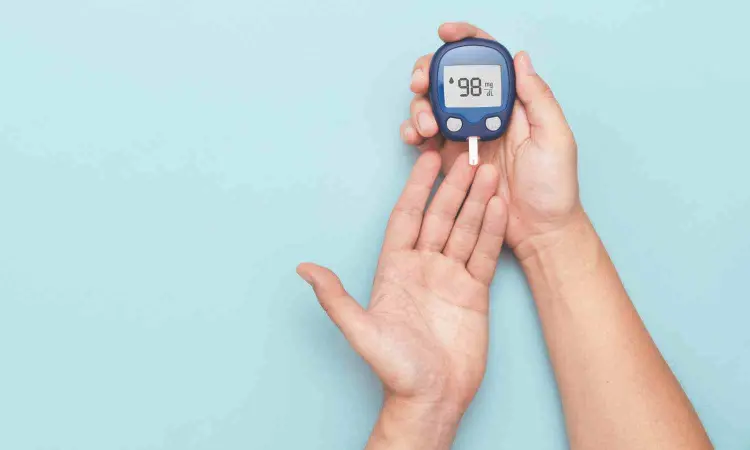- Home
- Medical news & Guidelines
- Anesthesiology
- Cardiology and CTVS
- Critical Care
- Dentistry
- Dermatology
- Diabetes and Endocrinology
- ENT
- Gastroenterology
- Medicine
- Nephrology
- Neurology
- Obstretics-Gynaecology
- Oncology
- Ophthalmology
- Orthopaedics
- Pediatrics-Neonatology
- Psychiatry
- Pulmonology
- Radiology
- Surgery
- Urology
- Laboratory Medicine
- Diet
- Nursing
- Paramedical
- Physiotherapy
- Health news
- Fact Check
- Bone Health Fact Check
- Brain Health Fact Check
- Cancer Related Fact Check
- Child Care Fact Check
- Dental and oral health fact check
- Diabetes and metabolic health fact check
- Diet and Nutrition Fact Check
- Eye and ENT Care Fact Check
- Fitness fact check
- Gut health fact check
- Heart health fact check
- Kidney health fact check
- Medical education fact check
- Men's health fact check
- Respiratory fact check
- Skin and hair care fact check
- Vaccine and Immunization fact check
- Women's health fact check
- AYUSH
- State News
- Andaman and Nicobar Islands
- Andhra Pradesh
- Arunachal Pradesh
- Assam
- Bihar
- Chandigarh
- Chattisgarh
- Dadra and Nagar Haveli
- Daman and Diu
- Delhi
- Goa
- Gujarat
- Haryana
- Himachal Pradesh
- Jammu & Kashmir
- Jharkhand
- Karnataka
- Kerala
- Ladakh
- Lakshadweep
- Madhya Pradesh
- Maharashtra
- Manipur
- Meghalaya
- Mizoram
- Nagaland
- Odisha
- Puducherry
- Punjab
- Rajasthan
- Sikkim
- Tamil Nadu
- Telangana
- Tripura
- Uttar Pradesh
- Uttrakhand
- West Bengal
- Medical Education
- Industry
Jinlida Promising for Diabetes Prevention in Patients with Impaired Glucose Tolerance: FOCUS Trial Reveals

China: In a groundbreaking development in the field of diabetes prevention, the results of the FOCUS randomized clinical trial have unveiled the potential of Jinlida, a traditional Chinese medicine formulation, in mitigating the risk of diabetes among individuals with impaired glucose tolerance (IGT) and multiple metabolic abnormalities. This landmark study offers new insights into alternative approaches for diabetes prevention and management, particularly in populations at high risk of developing the condition.
The randomized clinical trial of 889 participants with IGT and multiple metabolic abnormalities showed that Jinlida granules (JLD) reduced the incidence of diabetes compared with placebo.
"After a median follow-up of 2.20 years, the JLD group had a significantly lower risk of developing diabetes than the placebo group," the researchers reported in JAMA Internal Medicine.
Previous studies have shown that Jinlida granules, an approved treatment for type 2 diabetes in China, can reduce blood glucose levels, reduce glycated hemoglobin (HbA1c), and improve insulin resistance in people with type 2 diabetes. Hangyu Ji, Guang’anmen Hospital China Academy of Chinese Medical Sciences, Beijing, China, and colleagues aimed to evaluate the impact of long-term administration of JLD versus placebo on the incidence of diabetes in participants with IGT and multiple metabolic abnormalities.
For this purpose, the researchers conducted the FOCUS trial across 35 centers in 21 cities in China from 2019 to 2023. It enrolled individuals aged 18 to 70 years with IGT and multiple metabolic abnormalities
Participants were enrolled in a 1:1 ratio to receive JLD or placebo (9 g, 3 times per day, orally). They continued this regimen until they developed diabetes, were lost to follow-up, withdrew from the study, or died.
The primary outcome was diabetes occurrence, which was determined by two consecutive oral glucose tolerance tests. Secondary outcomes included waist circumference; HbA1c; fasting insulin level; fasting and 2-hour postprandial plasma glucose levels; homeostatic model assessment for insulin resistance (HOMA-IR); ankle-brachial index; total cholesterol, low-density lipoprotein cholesterol, and triglyceride levels; and carotid intima-media thickness.
The researchers reported the following findings:
· 889 participants were randomized, of whom 885 were in the full analysis set (442 in the JLD group; 443 in the placebo group; mean age, 52.57 years; 52.32% female).
· Following a median observation period of 2.20 years, participants in the JLD group had a lower risk of developing diabetes than those in the placebo group (hazard ratio, 0.59).
· During the follow-up period, the JLD group had a between-group difference of 0.95 cm in waist circumference, 9.2 mg/dL in 2-hour postprandial blood glucose level, 0.20% in HbA1c, 3.8 mg/dL in fasting blood glucose level, 6.6 mg/dL in total cholesterol level, 25.7 mg/dL in triglyceride levels, 4.3 mg/dL in low-density lipoprotein cholesterol level, and 0.47 in HOMA-IR compared with the placebo group.
· After 24 months of follow-up, the JLD group had a significant improvement in ankle-brachial index and waist circumference compared with the placebo group.
"The findings suggest that JLD can reduce diabetes risk in participants with IGT and multiple metabolic abnormalities," the researchers concluded.
Reference:
Ji H, Zhao X, Chen X, et al. Jinlida for Diabetes Prevention in Impaired Glucose Tolerance and Multiple Metabolic Abnormalities: The FOCUS Randomized Clinical Trial. JAMA Intern Med. Published online June 03, 2024. doi:10.1001/jamainternmed.2024.1190
Dr Kamal Kant Kohli-MBBS, DTCD- a chest specialist with more than 30 years of practice and a flair for writing clinical articles, Dr Kamal Kant Kohli joined Medical Dialogues as a Chief Editor of Medical News. Besides writing articles, as an editor, he proofreads and verifies all the medical content published on Medical Dialogues including those coming from journals, studies,medical conferences,guidelines etc. Email: drkohli@medicaldialogues.in. Contact no. 011-43720751


